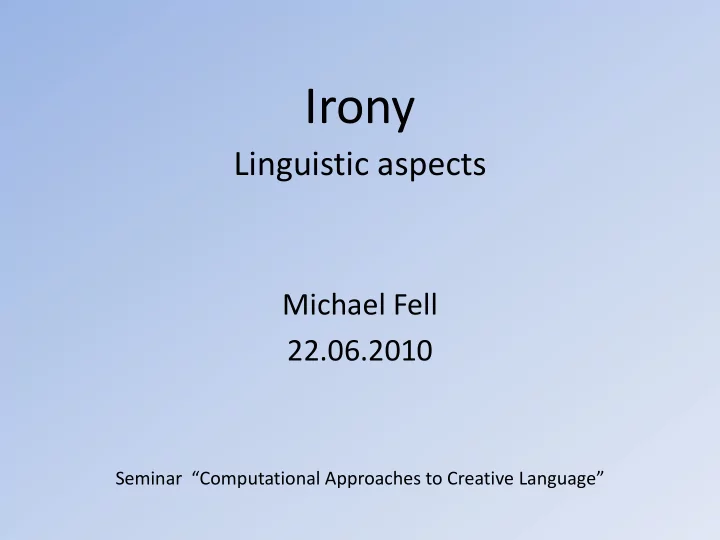

Irony Linguistic aspects Michael Fell 22.06.2010 Seminar “Computational Approaches to Creative Language”
Examples „Maybe you would help me with the dishes during half- time? I‘m sure the players will make it through the break without your support!“ “He cannot kick with his left foot, he cannot head a ball, he cannot tackle and he doesn't score many goals. Apart from that he's all right.” (George Best about David Beckham) „He‘s always late. But, isn‘t it great to have such a loving husband who truly cares about his secretaries?“
Irony in Talk Among Friends (Gibbs, 2000) • Conversations between students – recorded – transcripted the ironic statements • Types of ironic statements? • What are the topics? • Male / female usage patterns? • Mocking, critical, humorous, asymmetric? • Echo, pretense, tone of voice? • Reaction of the adressee
Irony in Talk Among Friends (Gibbs, 2000) Types of ironic statements Anne: Isn’t it so nice to have guests here? Dana: Totally! Anne: Our housemates bring in the most wonderful guests in the world and they can totally relate to us. Dana: Yes, they do. Anne: (laughs) Like I would just love to have them here more often (laughs) so I can cook for them, I can prepare (laughs) …
Irony in Talk Among Friends (Gibbs, 2000) Types of ironic statements Anne: Isn’t it so nice to have guests here? (rhetorical question) Dana: Totally! Anne: Our housemates bring in the most wonderful guests in the world and they can totally relate to us. (hyperbole) Dana: Yes, they do. Anne: (laughs) Like I would just love to have them here more often (laughs) so I can cook for them… (sarcasm)
Irony in Talk Among Friends (Gibbs, 2000) Types of ironic statements David is taking a Latin course… Sarah: You read all those ancient texts, that’s cool (laughs). David: Why you guys dissin’ on Latin? Sarah: (mocking tone) What, wo- ah, you’re dissin’ my Latin. (teasing)
Irony in Talk Among Friends (Gibbs, 2000) Types of ironic statements? occurences • Teasing 50% • Sarcasm 28% • Hyperbole 12% • Rhetorical Question 8% • (Understatement) 2% (n=6)
Irony in Talk Among Friends (Gibbs, 2000) What are the topics? Human concerns - The current situation - A past event - The adressee - Other people Hyperbole prefers other people or other comments
Irony in Talk Among Friends (Gibbs, 2000) Male / female usage patterns? - Women use more hyperbole than men (59% of all hyperbolic statements) - Men use more sarcasm (64% of all sarastic statements) Women prefer to be more funny while men need to be more aggressive?
Irony in Talk Among Friends (Gibbs, 2000) Mocking, critical, humorous, asymmetric? - All types are perceived as mocking (sarcasm wins with 90% of all sarcastic statements being mocking) - Sarcasm is the most critical type of ironic statements (~two times ciritical than all others) - All types are perceived as being humorous (~75% of all times) - Asymmetry of statement-meaning relation - Teasing: more often negative statements to transport positive meaning - Sarcasm: more often positive statement “hiding” negative, critical meaning
Irony in Talk Among Friends (Gibbs, 2000) Echo, pretense, tone of voice? - Teasing tends to echo the previous utterance and mimick the last speaker (50% echoic) - Other types are not very echoic (29% or less) - Teasing and sarcasm involved more pretense than other types (hyperbole and rhet. May transport there meaning without pretense) - All but hyperbole showed a special tone of voice (because the superlative is stressed by default?)
Irony in Talk Among Friends (Gibbs, 2000) Reaction of the adressee - Often responded ironically in return (21-33%) - With hyperboles most often literal response - A responding laughter was less frequent with the more critical sarcasm - more laughter with “group humoristic” hyperbole/rhet. Question - Responding to teasing may be easier and more appropriate than to hyperbole and especially rhet. questions
How to use that to find (and classify) ironic statements? • use contributions found in experiment – sarcasm is more often used by men. If you have a male speaker you could use this information – if the ironic statement is adressed to more than one person, it’s most likely not teasing or sarcasm – … • Analyze the voice tone. Is it “special”, a clue for an ironic statment? • If you have a dialogue representation. Look, if the topic is changed abruptly. • Recursively: Look, if the answer is ironic in return ;-)
Using lexical clues to find sarcasm (Kreuz & Caucci, 2007) 100 text passages (Google Book Search): “I like maths ”, Peter said sarcastically. The man said sarcastically , “You’re a great friend!” and went away. “Today, it’s going to rain”, the woman said.
Using lexical clues to find sarcasm (Kreuz & Caucci, 2007) 100 text passages (Google Book Search): “I like maths ”, Peter said. The man said , “You’re a great friend!” and went away. “Today, it’s going to rain”, the woman said.
Using lexical clues to find sarcasm (Kreuz & Caucci, 2007) How probable (1-7) is it that the speaker is being sarcastic in the following excerpt? (excerpt = parapgrph-1 and paragraph+1 added) 4.85 for “said sarcastically” (experimental items) 2.89 for “said” (control items)
Using lexical clues to find sarcasm (Kreuz & Caucci, 2007) identified linguistic clues: interjections attributed for 5% of all variance in the participants judgements (R^2=5% in a multivariate linear regression)
Thank you
References Raymond W. Gibbs. 2000. Irony in Talk Among Friends. Metaphor and Symbol, 15:5-27, 2000. Kreuz, R. J., & Caucci, G. M. (2007, April). Lexical influences on the perception of sarcasm. Paper presented at the Workshop on Computational Approaches to Figurative Language, annual meeting of the Human Language Technology Conference: North American Chapter of the Association for Computational Linguistics (HLT-NAACL), Rochester, NY.
Recommend
More recommend